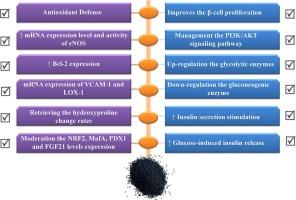Application of Nigella sativa as a functional food in diabetes and related complications: Insights on molecular, cellular, and metabolic effects
IF 3.8
2区 农林科学
Q2 FOOD SCIENCE & TECHNOLOGY
引用次数: 0
Abstract
Various studies have been conducted on the effect of medicinal plants in the treatment of different diseases, including diabetes. Nigella Sativa (N. sativa) is a plant with edible and medicinal properties that are of interest to scientists in traditional and complementary medicine, and much research has been conducted on this plant. Comprehensive reports are used to investigate the effect of N. sativa in vitro, animal models, and clinical trials in the treatment of diabetic diseases. An online database search was conducted to investigate the potential anti-diabetic effect of N. sativa. The results of various studies indicate that this plant can act as hypoglycemic, and due to antioxidant properties, it can have positive results in reducing blood sugar and glycosylated hemoglobin levels and controlling insulin secretion and glucose homeostasis. The effect of N. sativa in animal models has shown that N. sativa oil can eliminate oxygen-free radical species similar to hydroxyl free radicals and superoxide radical anions. Therefore, in this review study, we intend to address all the therapeutic aspects and effects of the black seed plant in the cellular and animal environment and clinical trial studies for the optimal use of this medicinal plant. In conclusion, the antidiabetic activities of N. sativa are indeed well established. However, in some cases, the molecular modulation underlying these activities remains unknown. N. sativa has been demonstrated to improve blood glucose and insulin levels, mitigate diabetes complications, and stimulate glucose absorption. Its antioxidant function, flavonoid and triterpenoid components, and potency to modulate insulin secretion in pancreatic cells introduced it as a safe medicinal herb for dietary adjuvant with antidiabetic medications. However, it has been declared to a decline in blood lipid profiles, and risk factors for cardiovascular diseases in Type 2 Diabetes patients. Further research must concentrate on patients unresponsive to available anti-diabetic drugs and hyperlipidemia T2D. Thus, further studies into its medicinal effects are recommended.

黑麦草作为功能性食品在糖尿病及相关并发症中的应用:对分子、细胞和代谢作用的见解
人们对药用植物治疗不同疾病(包括糖尿病)的效果进行了各种研究。Nigella Sativa(N. sativa)是一种具有食用和药用价值的植物,传统医学和补充医学领域的科学家对这种植物很感兴趣,并对其进行了大量研究。综合报告用于研究 N. sativa 在体外、动物模型和临床试验中治疗糖尿病疾病的效果。我们进行了在线数据库搜索,以研究 N. sativa 潜在的抗糖尿病作用。各种研究结果表明,这种植物可起到降血糖作用,而且由于其抗氧化特性,可在降低血糖和糖化血红蛋白水平、控制胰岛素分泌和葡萄糖稳态方面产生积极效果。荠菜油在动物模型中的作用表明,荠菜油可以消除类似羟基自由基和超氧自由基阴离子的无氧自由基物种。因此,在本综述研究中,我们打算探讨黑籽植物在细胞和动物环境中的所有治疗方面和效果,以及临床试验研究,以优化这种药用植物的使用。总之,黑升麻的抗糖尿病活性已得到公认。然而,在某些情况下,这些活性背后的分子调节机制仍然未知。事实证明,N. sativa 具有改善血糖和胰岛素水平、减轻糖尿病并发症和促进葡萄糖吸收的作用。它的抗氧化功能、黄酮类和三萜类成分以及调节胰腺细胞胰岛素分泌的功效使其成为一种安全的药草,可与抗糖尿病药物一起作为膳食辅助剂。然而,有研究表明,它能降低 2 型糖尿病患者的血脂状况和心血管疾病的风险因素。进一步的研究必须集中在对现有抗糖尿病药物无反应和患有高脂血症的 2 型糖尿病患者身上。因此,建议进一步研究其药用效果。
本文章由计算机程序翻译,如有差异,请以英文原文为准。
求助全文
约1分钟内获得全文
求助全文
来源期刊

Journal of Functional Foods
FOOD SCIENCE & TECHNOLOGY-
CiteScore
9.60
自引率
1.80%
发文量
428
审稿时长
76 days
期刊介绍:
Journal of Functional Foods continues with the same aims and scope, editorial team, submission system and rigorous peer review. We give authors the possibility to publish their top-quality papers in a well-established leading journal in the food and nutrition fields. The Journal will keep its rigorous criteria to screen high impact research addressing relevant scientific topics and performed by sound methodologies.
The Journal of Functional Foods aims to bring together the results of fundamental and applied research into healthy foods and biologically active food ingredients.
The Journal is centered in the specific area at the boundaries among food technology, nutrition and health welcoming papers having a good interdisciplinary approach. The Journal will cover the fields of plant bioactives; dietary fibre, probiotics; functional lipids; bioactive peptides; vitamins, minerals and botanicals and other dietary supplements. Nutritional and technological aspects related to the development of functional foods and beverages are of core interest to the journal. Experimental works dealing with food digestion, bioavailability of food bioactives and on the mechanisms by which foods and their components are able to modulate physiological parameters connected with disease prevention are of particular interest as well as those dealing with personalized nutrition and nutritional needs in pathological subjects.
 求助内容:
求助内容: 应助结果提醒方式:
应助结果提醒方式:


